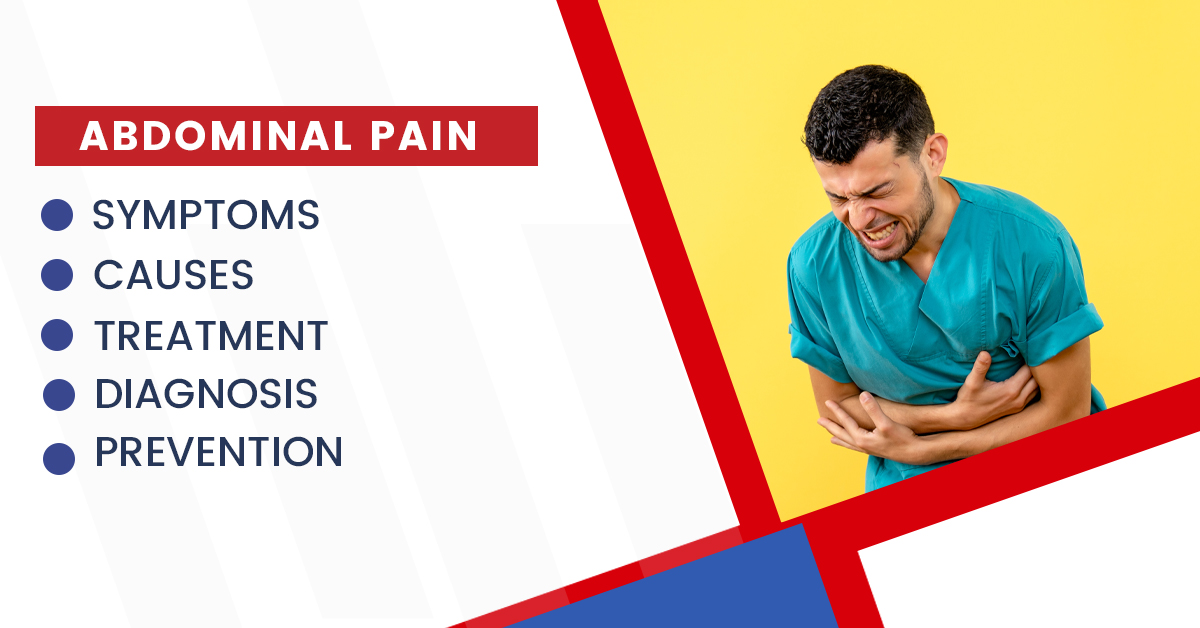What is Abdominal pain?
Almost Everyone will suffer abdominal pain, sometimes known as a stomach ache, at some point in their lives. Due to the wide variety of potential causes of stomach pain. It may arise in the absence of a diagnosable underlying ailment. However, gastrointestinal issues, inflammatory conditions, or infections can also be to blame.
People might have distinct abdominal discomfort experiences, which can vary in intensity. It frequently has a connection to nausea, vomiting, or digestive issues. Stomach discomfort can affect everyone, but young women are more likely to experience it than males.
To rule out other conditions as the source of abdominal pain, consult a doctor. However, it can typically be handled at home without outside assistance.
Symptoms of Abdominal Pain to Watch for Doctor:
If you experience any of the following, visit your physician or the emergency room of the closest hospital right away:
- extreme pain
- enduring discomfort for several hours.
- if you’re pregnant, any pain or bleeding in the vagina.
- If you’re a man, you feel pain in your scrotum.
- nausea or shortness of breath together with discomfort.
- suffering and blood vomiting.
- pee or feces with blood in them
- ache that travels to your shoulder, neck, or chest.
- sweating and fever.
- become clammy and pallid.
- being unable to urinate.
- being unable to pass gas or move your bowels.
- any other issues.
What causes Abdominal pain?
Abdominal pain can result from numerous conditions. Infection, abnormal growths, inflammation, obstruction, and digestive abnormalities, however, are the main reasons.
Bacteria can enter the digestive tract through infections of the gut, blood, or throat, which can result in stomach pain. Changes in metabolism, such as diarrhea or constipation, can also be brought on by these infections.
Menstrual cramps are another potential cause of lower abdomen pain, however, they are more frequently known to result in pelvic pain.
Additional typical factors for stomach pain include:
- constipation.
- diarrhea.
- gastroenteritis.
- acid reflux.
- vomiting.
- Stress.
gastrointestinal disorders can also lead to chronic abdominal pain. The majority are:
- gastroesophageal reflux disease (GERD)
- irritable bowel syndrome or spastic colon
- Crohn’s disease
- Lactose intolerance
Several factors can result in significant stomach pain:
- organ failure or organ near-failure (like a burst appendix or appendicitis)
- gallbladder stones
- kidney stones
- kidney infection
What are the types of abdominal pain?
We may categorize pain into three groups based on how long it lasts, which are as follows:
Acute pain. Acute stomach discomfort usually starts slowly and goes away within a few hours to a few days. Aside from acute abdominal pain, the numerous illnesses that cause it frequently include involve other symptoms that appear over hours or days. Minor ailments that go away on their own can be a cause, as can catastrophic medical situations, such as
- Abdominal aortic aneurysm
- Appendicitis
- Cholangitis (bile duct inflammation)
- Cholecystitis
- Cystitis (bladder inflammation)
- Diabetic ketoacidosis
- Diverticulitis
- Duodenitis (inflammation in the first part of the small intestine)
- Ectopic pregnancy (when the fertilized egg develops and implants outside of the uterus, for example, in a fallopian tube)
Chronic pain. Periodic (episodic) or intermittent chronic stomach discomfort is a possibility. This kind of pain could last for several weeks, months, or even years. Identifying the precise cause of chronic abdominal pain is frequently challenging. Mild to severe symptoms may be present, coming and going but not necessarily getting worse with time. conditions that could result in persistent stomach pain include
- Angina (reduced blood flow to the heart)
- Celiac disease
- Endometriosis
- Functional dyspepsia
- Gallstones
- Gastritis (inflammation of the stomach lining)
- Gastroesophageal reflux disease (GERD)
- Hiatal hernia
Progressive pain. Progressive pain is a type of chronic pain that keeps becoming worse over time. It is usually dangerous when abdominal discomfort gradually gets worse over time and is joined by the emergence of additional symptoms. increasing abdominal pain includes the following causes
- Cancer
- Crohn’s disease
- Enlarged spleen (splenomegaly)
- Gallbladder cancer
- Hepatitis
- Kidney cancer
- Lead poisoning
Other expressions for abdominal pain include
- Generalized pain. It indicates that more than half of your belly is affected. This kind of pain is more frequently related to gas, indigestion, or stomach viruses. A blockage in the intestines may be the source of the pain if it worsens.
- Localized pain. Only one part of your tummy is experiencing this ache. More frequently, it is a symptom of an issue with an organ such as the appendix, gallbladder, or stomach.
- Cramp-like pain. Most of the time, this kind of discomfort is not that severe. It most usually results from bloating and gas, and it frequently has diarrhea as a side effect. Pain that occurs more frequently lasts longer than 24 hours, or coexists with a fever are more concerning symptoms.
- Colicky pain. This kind of discomfort comes in waves. It frequently begins and stops abruptly, and it’s frequently severe. This kind of abdominal pain is frequently brought on by kidney stones and gallstones.
How can abdominal pain be prevented?
Abdominal pain cannot be prevented in all cases. However, there are several methods depending on the circumstance and underlying reasons for a person’s discomfort.
These techniques, according to many, can help prevent stomach pain:
- A balanced diet
- Awareness of allergies and food intolerance
- Stress avoidance
- Fewer alcoholic drinks and tobacco products
- Regular exercise or long walks
- Consistent treatment of known conditions
Numerous home health treatments may offer comfort if you and your doctor have concluded that your abdominal pain is not caused by a serious medical condition. Here is a list of a few:
- bitters and soda
- ginger
- chamomile tea
- The BRAT diet (bananas, rice, apple sauce, toast)
- peppermint
- apple cider vinegar
- heating pad
- warm bath
How is Abdominal pain diagnosed?
Based on your symptom history, a physical examination, and any necessary testing, the reason for your abdominal discomfort is determined. The nature of your discomfort and if you have any underlying medical or mental health disorders that might be causing your stomach pain are likely to be topics of conversation with your doctor.
Your doctor might inquire about the following features of your stomach pain:
- Where it’s located
- How intense it is
- Whether it’s dull, stabbing, burning, or cramping
- Whether it comes and goes
- When you experience or notice it most
- Whether it spreads to other regions of your body is up for debate.
- How long you’ve had it
- Whether any actions or activities seem to improve the situation or make it worse
Any of the following tests may be used to help identify the origin of your stomach discomfort if your doctor detects a serious medical condition that may require treatment:
- Blood, urine, or stool tests
- X-ray of the abdomen
- Ultrasound of the abdomen
- Computerized tomography (CT) scan of the abdomen
- Barium enema (colon X-ray)
- Endoscopic procedures (passing a small camera-equipped tube through your mouth or rectum to observe specific locations inside your digestive tract)
- Electrocardiogram (ECG or EKG)
How is Abdominal pain treated?
There are many different reasons and treatments for stomach pain. Surgery could be necessary for some illnesses, such as gallstones or appendicitis. Medication may be used to treat other conditions, such as infections and ulcers. And occasionally you might have to endure a kidney stone or a case of stomach sickness until it passes.
In cases where abdominal pain doesn’t go away by itself, it’s crucial to find the cause. Keep in mind that even minor conditions might develop into serious ones. However, you can start by treating yourself if you’re quite certain that your stomachache is connected to digestion.
- Bowel rest. Eat nothing or only simple things like crackers or bananas that are easy to digest.
- Take in a lot of water or a hydration drink.
- Heat therapy. Consider using a warm water bottle or taking a bath.
- Home remedies. Licorice can aid with gas, ginger can help with indigestion, and peppermint can help your digestive muscles relax.
Even without therapy, typical causes of gastrointestinal belly pain such as gas, indigestion (dyspepsia), constipation, and upset stomach will likely disappear in a few hours today. For quicker relief, you might try over-the-counter (OTC) medicines. You can get advice on the best medication from your doctor or pharmacist. OTC choices consist of
- Antacids and acid reducers
- Antigas products like Maalox
- Anti-nausea medication
- Stool softeners for constipation
After the stomach or intestinal lining has had time to heal, other gastrointestinal causes of abdominal discomforts, such as food poisoning, gastritis, or peptic ulcer disease, may also subside. Medical procedures may consist of:
- Antibiotics for bacterial causes
- Acid reducers and acid blockers
- Pepto-Bismol
- Electrolyte replacement beverages for diarrhea or vomiting to avoid dehydration


